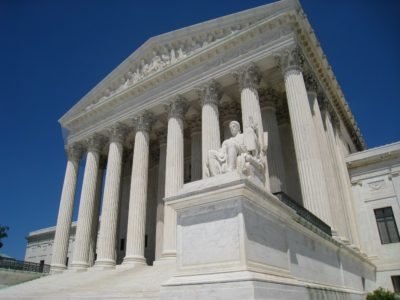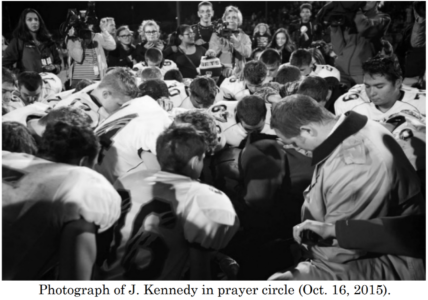Public School Employees Should Not Elevate Any Faith Over Another
 (June 28, 2022) In yet another opinion centering extremist views, the U.S. Supreme Court has further constrained public schools’ ability to protect all students’ religious freedom and free expression. The Court’s 6-3 opinion in Kennedy v. Bremerton School District held that a public high school violated the free speech and free exercise clauses of the First Amendment when it required a football coach to respect the rights of students from all religious and cultural backgrounds by directing the coach to stop publicly praying on the field immediately after games.
(June 28, 2022) In yet another opinion centering extremist views, the U.S. Supreme Court has further constrained public schools’ ability to protect all students’ religious freedom and free expression. The Court’s 6-3 opinion in Kennedy v. Bremerton School District held that a public high school violated the free speech and free exercise clauses of the First Amendment when it required a football coach to respect the rights of students from all religious and cultural backgrounds by directing the coach to stop publicly praying on the field immediately after games.
“No student should ever be made to feel excluded because they don’t share the religious beliefs of their coaches, teachers or fellow students,” said Celina Moreno, J.D., IDRA President and CEO. “Yesterday’s decision makes it harder for schools to safeguard students’ rights to free speech and religious expression and to ensure no student is pressured to conform to religious norms inconsistent with their personal beliefs.”
Significantly, the undisputed record showed that Kennedy:
- had a longstanding practice of conducting demonstrative prayers on the 50-yard line;
- consistently invited other students and coaches to join his prayers;
- for years prior to the lawsuit led student-athletes in “motivational” prayers as part of his coaching; and
- went on a media tour, presenting himself as a coach who “made a commitment with God” to several local and national news outlets.
 The coach’s conduct also created significant safety concerns for students, as coaches, players, and members of the public would “stampede” the field when Kennedy knelt to pray. Given this context, it comes as no surprise that students described feeling coerced to participate in their coach’s increasingly public, orchestrated prayers. These facts, corroborated with photographic evidence, refute the Court’s characterization of the coach’s activity as an “individual,” “private,” “brief” or “quiet” prayer.
The coach’s conduct also created significant safety concerns for students, as coaches, players, and members of the public would “stampede” the field when Kennedy knelt to pray. Given this context, it comes as no surprise that students described feeling coerced to participate in their coach’s increasingly public, orchestrated prayers. These facts, corroborated with photographic evidence, refute the Court’s characterization of the coach’s activity as an “individual,” “private,” “brief” or “quiet” prayer.
This is the second opinion this term where the U.S. Supreme Court has brazenly bulldozed foundational legal principles protecting the civil rights and religious freedom of all children, educators and communities. Read together with Carson v. Makin issued last week, Kennedy sets a dangerous precedent further eroding the principle of separation of church and state in public schools. Compounding the harmful impacts of the decision, the Supreme Court in Kennedy also overruled Lemon v. Kurtzman, a 1971 precedent that helped prevent the entanglement of government and religion.
Writing for the dissent, Justice Sonia Sotomayor correctly concluded: “Today’s decision is particularly misguided because it elevates the religious rights of a school official, who voluntarily accepted public employment and the limits that public employment entails, over those of his students, who are required to attend school and who this Court has long recognized are particularly vulnerable and deserving of protection.”



